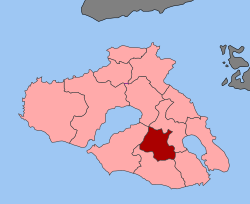Agiassos
|
Agiasos Αγιάσος |
|
|---|---|
| Coordinates: 39°2′N 26°25′E / 39.033°N 26.417°ECoordinates: 39°2′N 26°25′E / 39.033°N 26.417°E | |
| Country | Greece |
| Administrative region | North Aegean |
| Regional unit | Lesbos |
| Municipality | Lesbos |
| • Municipal unit | 79.924 km2 (30.859 sq mi) |
| Elevation | 452 m (1,483 ft) |
| Population (2011) | |
| • Municipal unit | 2,373 |
| • Municipal unit density | 30/km2 (77/sq mi) |
| Time zone | EET (UTC+2) |
| • Summer (DST) | EEST (UTC+3) |
| Postal code | 811 01 |
| Area code(s) | 22520 |
| Vehicle registration | MY |
Agiasos (Greek: Αγιάσος) is a small town and a former municipality on the island of Lesbos, North Aegean, Greece. Since the 2011 local government reform, it became a municipality unit that is part of Lesbos. The municipal unit has an area of 79.924 km2. It is located at the slopes of mount Olympos, at a height of 475 meters (1,558 ft), 26 kilometers (16 mi) from Mytilene. It is known for its special bright green landscape, its narrow cobbled streets lined by ranks of tiled-roof houses, the traditional architecture and its restless and religious inhabitants. Agiasos, the artistic and religious centre of the island, is a preserved settlement that has many to offer to visitors. The reading society of Anaptixi, a famous cultural institution, was established in 1894, when the village was still under Turkish rule. Today it has a great library, a theatre hall, a folklore museum and an active organization which tries to continue the traditions that were passed by the old inhabitants.
The history of the village (population 2,498 in 2001 census) is identified with the history of Panayia of Ayasos (the Greek word for Virgin Mary of Agiasos).
About 1,200 years ago, during the Byzantine Era, toward the end of the 8th century, it was a time of the wars of iconclasm. In Constantinople, Aghathon the Ephesian, priest of the Chapel of the Palaces, who was an iconophile, fell into the disfavour of Emperor Leo I and was self-exiled to Jerusalem. In early 802, Aghathon heard that Empress Irene of Athens, who was also an iconophile, lived in exile on Lesvos island. Wishing to meet her and be nearer to Constantinople, he sets off for Lesvos, taking with him an icon of "Panayia I Vrefokratousa" (Madonna and the Holy Infant), a Silver Cross with wood from the True cross, a manuscript Gospel, and other relics.
...
Wikipedia


